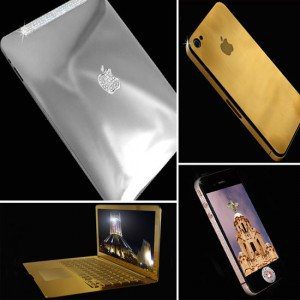Where is the sweet spot for luxury brands in digital marketing? I know that not a few luxury brands have been asking themselves this and other related questions about luxury brands digital marketing:
- How important is the brand’s “institutional” website?
- To have or not to have a Facebook page?
- To allow Facebook Connect on the website?
- To what extent to worry about Search Engine Marketing?
- Is User Generated Content absolutely verboten?
- What of eCommerce?
- To what extent should/can digital be integrated into the instore experience?
Aligning digital with business objectives
The answer, of course, for each of these questions will vary for each brand. I have written this piece about the challenge for luxury brands online. Depending on their specific situation, brands must systematically relate their digital marketing activities with the objectives they are wishing to achieve for the business overall. When I discuss with brands their digital marketing strategy, there are four questions I like to ask:
- where are your clients spending time
- who influences them?
- what are you trying to achieve that you can’t already achieve offline?
- is the internal culture of the company/brand adapted to the requirements of digital marketing?
Luxury brands’ options
Starting with incisive consumer insights, I think there are a many good angles for luxury digital marketing. Some sectors are less evident than others (i.e. private wealth management, bespoke boutique tailors or jewellers…). But, for others, there are definitely opportunities out there. The ultra rich live in protected spheres. As the level of wealth increases, the isolation can tend to increase. That said, the ultra wealthy (usually) men are attached to others — notably a spouse — who may be more inclined to want to be connected.
Here is my guess as to how some of the hyper rich might use different digital media. Based on these insights, the challenge in luxury brands digital marketing becomes finding ways to provide valuable solutions and interactions that are deeply contextual. {Click to tweet}
Search & Social
Whether uber rich, hyper rich or just plain rich, no one escapes the internet. Even the rich must search on the all-democratic Google. Some deign to participate in social media networks, but “exclusive” networks such as Path or Small World would be a preferred domain, specifically to avoid inevitable promotional and paparazzi-type pollution. The choice of such social networks will inevitably depend on the people within his/her vicinity. There are two relevant insights: (1) unless they are of the Mark Zuckerberg or Larry Ellison ilk, the super rich are generally not geeks and, thus, they will probably be users of the banner aka most reliable names, such as Google, YouTube. (2) Especially if they have a large direct family, they are probably familiar with Facebook (albeit probably via someone else’s account, according to their level of discretion). However, as soon as a digital media is called into question for dubious practices (i.e. spamming, insecure database…), that will be the death knell as far as getting high end “luxury prone” traffic. {Click to tweet}
Devices
Beyond the multiple phones (i.e. several personal and one professional), the wealthy have amply adopted tablet devices. The iPad has become de rigueur on the regular travel schedule, not to mention being sprinkled out among all various family members and throughout the different residences. One thing to consider is that the 3G/4G tablet may well end up being the device of choice because of the readability (easy access to news in the morning), portability (international travel) and relative ease of use for emails. At different parts of the year, they will be on holidays, possibly on yachts, private planes or in villas in remote destinations. The question is how to make connections that are not intrusive and appear to add value to their lives. Not all brands need apply!
N.B. Dedicated apps that provide a great customer experience, security and make it to the “front page” of the device will be hallowed territory for luxury digital marketing teams. That’s why it would be worth taking a close look at apps like Zite and Flipboard…
Privacy and security
Few people are more protective of their privacy than the rich and famous. So, utter respect of data is vital. It is unlikely that they will be willing or be interested in sharing personal content or information. With the blowing up of Prism and other national surveillance programs, protection of privacy may well become even more important.
The Cloud
While the rich may have heightened concerns about privacy, the fact is that they will likely have multiple homes. Thus, the cloud is a savior for keeping all their digital assets synchronized. On a personal level, I think of the need for music collections and photographs to be “everywhere.”
Influence marketing2
As closed as an affluent individual might be to the digital world, knowing how to interface with and influence the people in his/her inner circle can be a route to their heart. There are ever better tools for figuring out who are the influencers online. However, as with all the luxury marketing efforts, such influence-based marketing must involve a blend of off and online methods.
The Kids’ effect
As rich as they may be, the kids are still going to school and interacting with kids of other socio-economic strata. Consequently, the kids are bound to influence “sugar” daddy to see what is going on via YouTube, Facebook or Twitter… Travelling around the world, they may be using VOIP (ie Skype) to stay connected, pushed on by their kids at college or living overseas.
LuxureeeCommerce
As hard and as paradoxical as an eCommerce site might seem for luxury brands (available everywhere, to everyone, with transparency on pricing…), affluent people will inevitably enjoy the practicality, discretion (no store visit) and accessibility of buying online. The trick is finding ways to make the site at once a magnificent, representative of the brand as well as providing an excellent user experience when it comes to the purchase (security, ease of navigation, payment, etc).
Using digital tools and services in one’s marketing mix is inevitable for most luxury brands. Today, many luxury brands are approaching digital marketing with great trepidation (fear of openness, speed, potential crises, lack of exclusivity, …). If the internal brand culture isn’t there to support it (including having a tolerance for risk, experimentation and failure), surely the first point of call will be working on a cultural shift. Defining and speaking in a strong, differentiable voice for the brand, finding and hiring digital talent and having an obsession with the customer experience will be key to the success of these efforts. [I would be remiss not to stress the benefits of putting the 5E’s into good effect, as well.]
Your thoughts and reactions, please!















About #2: "who influences them?" Are these similar in concept with search influencers or more of popular figures identified with brands (ie celebrities)?
About #2: "who influences them?" Are these similar in concept with search influencers or more of popular figures identified with brands (ie celebrities)?